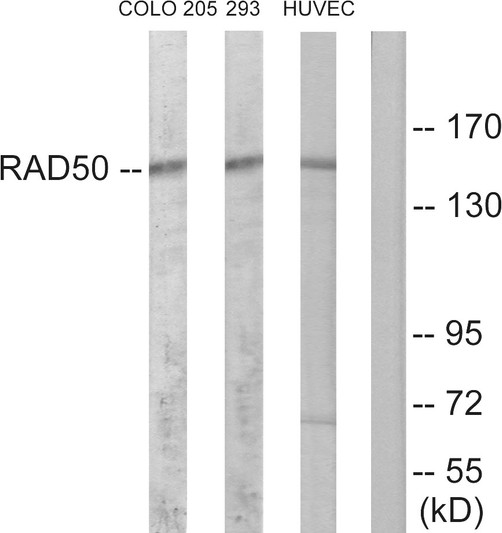| Host: | Rabbit |
| Applications: | WB/IHC/IF/ELISA |
| Reactivity: | Human/Mouse/Rat |
| Note: | STRICTLY FOR FURTHER SCIENTIFIC RESEARCH USE ONLY (RUO). MUST NOT TO BE USED IN DIAGNOSTIC OR THERAPEUTIC APPLICATIONS. |
| Short Description : | Rabbit polyclonal anti-DNA repair protein RAD50 (681-730 aa) for use in WB, IHC, IF and ELISA in Human, Mouse and Rat samples. Datasheet included with dilution recommendations, and related reagents. |
| Clonality : | Polyclonal |
| Conjugation: | Unconjugated |
| Isotype: | IgG |
| Formulation: | Liquid in PBS containing 50% Glycerol, 0.5% BSA and 0.02% Sodium Azide. |
| Purification: | The antibody was affinity-purified from rabbit antiserum by affinity-chromatography using epitope-specific immunogen. |
| Concentration: | 1 mg/mL |
| Dilution Range: | WB 1:500-1:2000IHC 1:100-1:300ELISA 1:20000IF 1:50-200 |
| Storage Instruction: | Store at-20°C for up to 1 year from the date of receipt, and avoid repeat freeze-thaw cycles. |
| Gene Symbol: | RAD50 |
| Gene ID: | 10111 |
| Uniprot ID: | RAD50_HUMAN |
| Immunogen Region: | 681-730 aa |
| Specificity: | Rad50 Polyclonal Antibody detects endogenous levels of Rad50 protein. |
| Immunogen: | The antiserum was produced against synthesized peptide derived from the human RAD50 at the amino acid range 681-730 |
| Post Translational Modifications | Phosphorylation at Ser-635 by ATM in response to DNA damage is required for double-strand break (DSB) repair. |
| Function | Component of the MRN complex, which plays a central role in double-strand break (DSB) repair, DNA recombination, maintenance of telomere integrity and meiosis. The MRN complex is involved in the repair of DNA double-strand breaks (DSBs) via homologous recombination (HR), an error-free mechanism which primarily occurs during S and G2 phases. The complex (1) mediates the end resection of damaged DNA, which generates proper single-stranded DNA, a key initial steps in HR, and is (2) required for the recruitment of other repair factors and efficient activation of ATM and ATR upon DNA damage. The MRN complex possesses single-strand endonuclease activity and double-strand-specific 3'-5' exonuclease activity, which are provided by MRE11, to initiate end resection, which is required for single-strand invasion and recombination. Within the complex, RAD50 is both required to bind DNA ends and hold them in close proximity and regulate the activity of MRE11. RAD50 provides an ATP-dependent control of MRE11 by positioning DNA ends into the MRE11 active site: ATP-binding induces a large structural change from an open form with accessible MRE11 nuclease sites into a closed form. The MRN complex is also required for DNA damage signaling via activation of the ATM and ATR kinases: the nuclease activity of MRE11 is not required to activate ATM and ATR. The MRN complex is also required for the processing of R-loops. In telomeres the MRN complex may modulate t-loop formation. |
| Protein Name | Dna Repair Protein Rad50Hrad50 |
| Database Links | Reactome: R-HSA-2559586Reactome: R-HSA-5685938Reactome: R-HSA-5685939Reactome: R-HSA-5685942Reactome: R-HSA-5693548Reactome: R-HSA-5693554Reactome: R-HSA-5693565Reactome: R-HSA-5693568Reactome: R-HSA-5693571Reactome: R-HSA-5693579Reactome: R-HSA-5693607Reactome: R-HSA-5693616Reactome: R-HSA-6804756Reactome: R-HSA-69473Reactome: R-HSA-912446Reactome: R-HSA-9701192Reactome: R-HSA-9704331Reactome: R-HSA-9704646Reactome: R-HSA-9709570Reactome: R-HSA-9709603 |
| Cellular Localisation | NucleusChromosomeTelomereLocalizes To Discrete Nuclear Foci After Treatment With Genotoxic AgentsLocalizes To Dna Double-Strand Breaks (Dsbs) |
| Alternative Antibody Names | Anti-Dna Repair Protein Rad50 antibodyAnti-Hrad50 antibodyAnti-RAD50 antibody |
Information sourced from Uniprot.org










